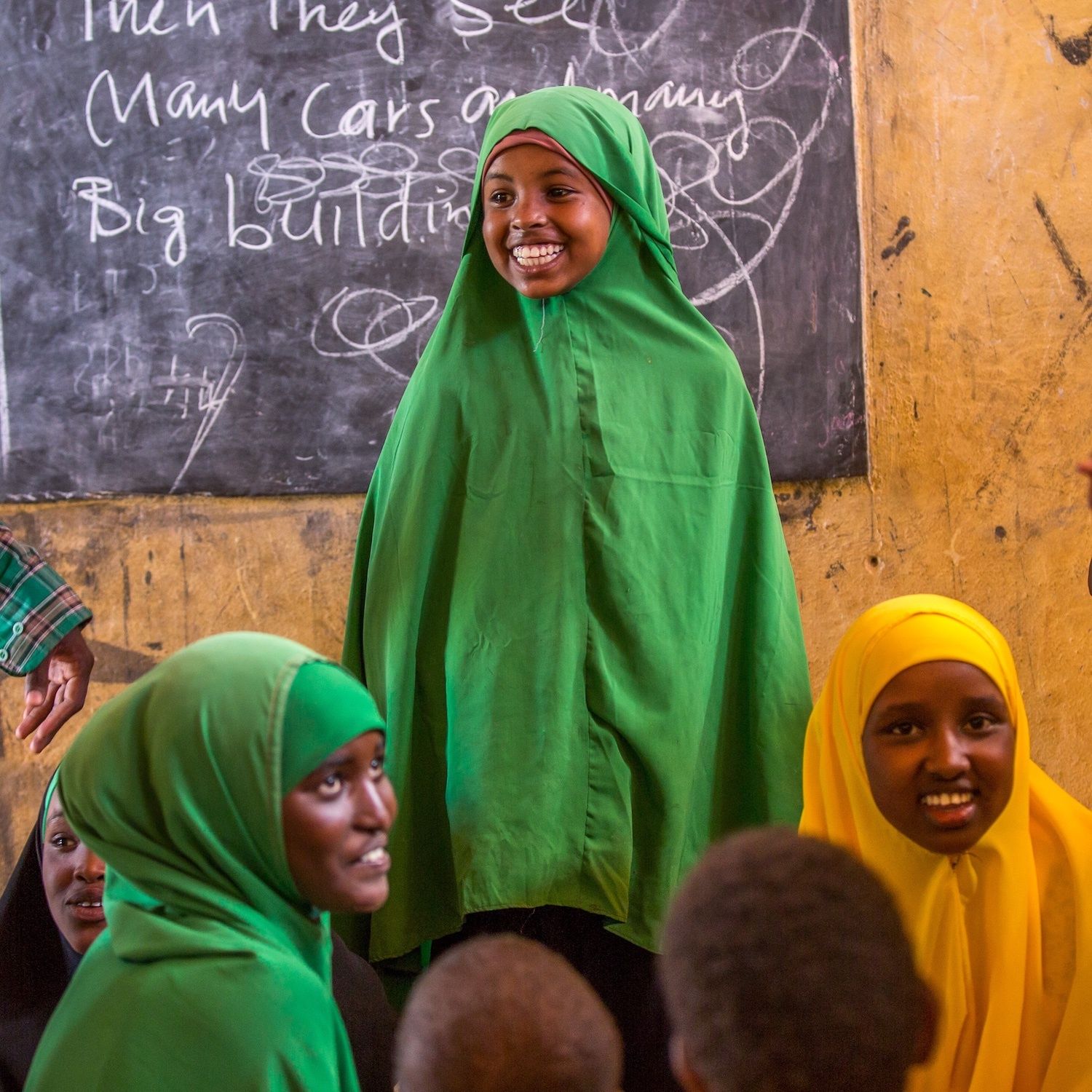 Sign in
Sign in
Government
Science
VoxDev.org
Hear about the cutting edge of development economics from research to practice.

S1 Ep54: Is financial literacy necessary?
We often try to improve incomes and financial decision-making of working people by teaching financial literacy. But in Uganda an intervention tested whether learning by saving in a bank account might also be an effective route to knowledge. If this works, Dean Karlan tells Tim Phillips, it might be a low-cost route to financial inclusion.
14:2013/09/2021

S1 Ep53: Slippery fish
When the government in Chile attempts to limit which fish can be caught and sold to protect stocks, market traders always find a way around the restrictions. Ahmed Mushfiq Mobarak tells Tim Phillips the story of an experiment in how to enforce regulation -- with a surprise finding that could change how compliance works in other industries too.
22:5410/09/2021

S1 Ep52: Using role models in Somali schools
How can Somalia's schools inspire kids to finish their education and learn about gender equality? A low-cost intervention uses role models with surprising success, says Munshi Sulaiman of BRAC.
13:2108/09/2021

S1 Ep51: The effects of crime on jobs in Mexico
When drug-related violence exploded in Mexico, its effects were felt by everyone. Andrea Velásquez tells Tim Phillips how rising violence in Mexico City affected the willingness of people - especially women - to go to work.
17:4606/09/2021

S1 Ep50: Reshaping gender attitudes in India
Children decide what's normal for girls and boys early in their development. Seema Jayachandran tells Tim Phillips how a program of discussions about gender equality at school can successfully change damaging attitudes to women's rights.
14:4803/09/2021

S1 Ep49: Letting managers manage
If you want to succeed as a boss, business books tell you, you have to delegate. But we know less than you think about the impact of delegation on productivity and profitability. Namrata Kala of MIT tells Tim Phillips how some Indian SOEs decided to let managers manage, giving us a new insight into the impact of managerial autonomy.
15:2101/09/2021

S1 Ep48: The false promises of agricultural trials
Often we hear exciting news of crop yields from experimental trials, but then the gains don't show up in the real world. Rachid Laajaj tells Tim Phillips how a group of researchers solved this puzzle, and what this means for how we conduct trials in future.
23:0230/08/2021

S1 Ep47: Public disclosure as a political incentive: Evidence from municipal elections in India
Councilors who thought performance reports would be published before an election invested more in infrastructure, with positive impacts on re-election
Read “Public Information is an Incentive for Politicians: Experimental Evidence from Delhi Elections” by Abhijit Banerjee, Nils Enevoldsen, Rohini Pande, and Michael Walton here.
14:4624/02/2021

S1 Ep47: The unintended impacts of formal credit programmes on social networks: Evidence from India
The introduction of financial institutions in communities may generate long-lasting externalities, including losses in informal social linkages
Read “Changes in social network structure in response to exposure to formal credit markets” by Abhijit Banerjee, Emily Breza, Arun G. Chandrasekhar, Esther Duflo, Matthew O. Jackson, and Cynthia Kinnan here.
15:2117/02/2021

S1 Ep47: Learning-by-doing: Navigating financial technologies among Bangladeshi factory workers
How automatic payments can help individuals save more and better protect themselves against consumer risks
Read “Learning to navigate a new financial technology: Evidence from payroll accounts” by Emily Breza, Martin Kanz, and Leora F. Klapper here.
18:0202/02/2021

S1 Ep47: Is faster always better? Evidence from Mexico’s digital credit market
Access to fast cash through digital credit may put consumers at risk for over-indebtedness and likelihood of default
Read “Too fast, too furious? Digital credit delivery speed and repayment rates” by Alfredo Burlando, Michael A. Kuhn, and Silvia Prina here.
20:1901/02/2021

S1 Ep46: Designing more effective interventions to prevent childhood stunting: Evidence from Nigeria
Bundling interventions that offer parents health information along with cash transfers might yield more sustainable changes in early-life health outcomes for children
24:4327/01/2021

S1 Ep47: Designing more effective interventions to prevent childhood stunting: Evidence from Nigeria
Bundling interventions that offer parents health information along with cash transfers might yield more sustainable changes in early-life health outcomes for children
Read “The impacts of a multifaceted pre-natal intervention on human capital accumulation in early life” by Pedro Carneiro, Lucy Kraftman, Giacomo Mason, Lucie Moore, Imran Rasul and Molly Scott here.
24:4327/01/2021

S1 Ep46: Urban-rural gaps in the developing world: Does internal migration offer opportunities?
Policymakers might seek to address the frictions that prevent potentially beneficial migration to urban areas from taking place
Read “Urban-Rural Gaps in the Developing World: Does Internal Migration Offer Opportunities?” by David Lagakos here.
17:5120/01/2021

S1 Ep46: Unintended consequences: How workfare programmes may fuel school dropouts in India
Despite evidence of increasing household wages, anti-poverty schemes in India can have an adverse effect by lowering human capital investment
Read “Workfare and Human Capital Investment: Evidence from India” by Manisha Shah and Bryce Millet Steinberg here.
15:1013/01/2021

S1 Ep46: How does shame and embarrassment impact social learning? Evidence from India
People are less likely to ask questions in their communities if it exposes the limits of their knowledge.
Read “Signaling, shame, and silence in social learning” by Arun G. Chandrasekhar, Benjamin Golub, and He Yang here.
14:2006/01/2021

S1 Ep46: Failure of frequent assessment: Evidence from India’s continuous and comprehensive evaluation programme
More frequent assessment of student performance fails to deliver on improved outcomes when the administrative burden on teachers is high
13:4908/12/2020

S1 Ep45: Should electricity be a right? Evidence from India
Nearly a billion people around the world are not connected to the electricity grid, and even more have unreliable access. In this VoxDevTalk, Robin Burgess discusses his paper with Michael Greenstone, Nicholas Ryan, and Anant Sudarshan in which the authors argue that a social norm that all people deserve access to electricity regardless of payment may actually be undermining the universal access called for in Sustainable Development Goal 7. When people feel no compulsion to pay for the electricity they use, whether or not they are able to, government-owned distribution companies need to ration supply to limit their losses, either by enforcing blackouts or restricting access. This tends to affect those living in the poorer areas of countries more, and research on the relationship between electricity consumption and GDP suggests that it also has a macro impact on economic growth. One possible way to move from this low-payment, low-access equilibrium to a high-payment, high-access one is for governments to provide targeted subsidies towards getting connected to the grid, and for people to then pay for the electricity they use.
13:1525/11/2020

S1 Ep45: Technology as a tool for governance: Evidence from China
Incentivising agent performance is a double-edged sword: while it can encourage agents to perform better, it might also nudge them into cheating and manipulating results to their benefit. In this VoxDevTalk, Guojun He discusses his work with Michael Greenstone, Ruixue Jia, and Tong Liu on this classic principal-agent problem in the context of how Chinese local governments self-report meeting air pollution-reduction targets imposed (and incentivised) by the central government. An analysis of these reports reveals evidence of significant under-reporting by local governments before the central government installed automated real-time pollution monitoring devices across the country. Under-reporting was larger in areas with higher levels of actual pollution, ostensibly since these local governments face greater challenges in meeting pollution-reduction targets. How accurately local governments report pollution figures also has impacts on public welfare, with people exposed to pollution information more likely to search for information on face masks and air filters. Biased information thus prevented people from optimally protecting themselves prior to the introduction of automation.
13:5611/11/2020

S1 Ep45: How does funding influence sectoral and geographic spread of NGOs?
Certain kinds of NGO-led development projects attract more funding and media attention than others. Child sponsorship or microcredit schemes, for instance, tend to be 'hotter' than rehabilitation projects. To what extent does this knowledge affect the fundraising agenda of NGOs? What causes NGOs to 'cluster' around specific causes in favour of others? And what can be done to diversify NGO (and donor) attention?
In this VoxDevTalk, Thierry Verdier examines the motivations of NGO competition and its impact on the development sector, of which NGOs are a significant part. Competition for funding routinely induces NGOs to systemically undercover 'Cinderella projects', which remain chronically underfunded. Is the solution to this problem better coordination on fundraising activities between NGOs or is it government intervention? In a new research paper, he and his co-authors Gani Aldashev and Marco Marini look at aid data to analyse NGO clustering around certain sectors and geographic regions and propose possible mechanisms that influence such behaviour.
14:1004/11/2020

S1 Ep45: Gender norms, rule of law, and female entrepreneurship in developing countries
Entrepreneurship across the world is highly male dominated. While the amount of subsistence entrepreneurship in developing countries leads to a slightly more equal gender balance, female entrepreneurs in these countries tend to choose sectors where other women are. In this VoxDevTalk, Nava Ashraf and Ed Glaeser discuss their work with Alexia Delfino investigating how gender norms and weak rule of law put female entrepreneurs at a disadvantage. Fear of expropriation by men leads them to work in less profitable industries, such as tailoring or food production, where they can collaborate with other women rather than with men. A survey of the manufacturing sector in Zambia, for example, revealed that almost all of the gap in earnings between male and female entrepreneurs could be explained by female entrepreneurs entering low-paid industries. Relatively equal gender norms that increase women’s bargaining power and decent rule of law for contract enforcement can encourage more women to become entrepreneurs and to branch out to more profitable industries.
21:4228/10/2020

S1 Ep45: The selection of talent: Experimental and structural evidence from Ethiopia
When faced with onerous procedures to apply for a job, potential applicants can be expected to weigh the costs of applying on their time and energy against the probability of their getting the job and the eventual benefits. It is widely believed that if recruiters raise the costs of applying for a job, only the most suited and driven candidates can be expected to apply. In this VoxDevTalk, Stefano Caria shares insights from his paper with Girum Abebe and Esteban Ortiz-Ospina, in which the authors start from the assumption that the cost of applying for a job may be higher for the best applicants. Through their field experiment in Ethiopia, they find that employers find better applicants when they reimburse the applicants for submitting their application and appearing for the selection test. Moreover, they are also able to find high-quality candidates from relatively disadvantaged backgrounds who would have been otherwise deterred by the costs of applying.
15:0321/10/2020

S1 Ep45: Paying outsourced labour: Evidence from Argentina
When workers are supplied to a company through a temp agency, they earn less than the permanent employees they end up working with. Since work place surveys usually do not capture the pay of outsourced labour, there is insufficient data on the pay differential between contract workers and full-time workers. In this VoxDevTalk, Simon Jäger of MIT discusses a new paper where he and his co-authors estimate how much firms differentiate pay premia between regular and outsourced workers. They overcome the above measurement challenge by using a unique, Argentinian administrative dataset, featuring links between user firms (the workplaces where temp workers perform their labour) and temp agencies (their formal employers). They estimate that temp agency workers receive 49% of the workplace-specific pay premia earned by regular workers in user firms: the midpoint between the benchmark for insiders and the competitive spot-labour market benchmark.
14:3914/10/2020

S1 Ep45: Incentivising behavioural change: The role of time preferences
Incentivising people to lead healthier lives by means of monetary payments is a simple and cost-effective intervention, but are there ways to tweak that basic incentive contract to make it work particularly well for people who are impatient (those who discount future benefits for immediate gain)? In this VoxDevTalk, Rebecca Dizon-Ross discusses a randomised experiment that varied the design of payment incentives: bundling payments over time meaningfully increased effort among the impatient relative to the patient; in contrast, increasing payment frequency had limited efficacy, which suggests limited impatience over payments.
13:4307/10/2020

S1 Ep45: Do social structures affect the success of development policies?
Relationships between groups are vital in village economies, but do these social structures affect the success of development policies? If resources are delivered by someone from the community, does the social relationship between that agent and the people who could benefit from the success of the intervention matter? In this VoxDevTalk, Oriana Bandiera discusses an experiment in Uganda that addresses these questions. Randomly selecting one of two viable candidates to deliver an agricultural extension programme in rural Ugandan villages, she and her co-authors find that delivery agents favour their own social ties over ex-ante identical farmers connected to the other (unselected) candidate and that this is inconsistent with output maximisation or targeting the poorest. Favouritism disappears when both potential delivery agents belong to the same social group. Using the randomised allocation of the programme across villages, they show how unobserved social structures explain the variation in in delivery rates and programme effectiveness that they often observe in the data.
09:4623/09/2020

S1 Ep45: Negotiating a better future: Experimental evidence from Zambia
Across the developing world, many girls face difficulties in persuading their parents to enrol them in secondary education. Whilst financial incentives have often been analysed as a means to encourage female school enrollment, there has been little focus on the role of negotiation skills. In this VoxDevTalk, Kathleen McGinn discusses an innovative experiment in Zambia, which assesses the impact of negotiation skills on female educational outcomes. Fascinatingly, the researchers find that teaching negotiation skills significantly increased female educational outcomes, particularly for high-ability girls.
16:4302/09/2020

S1 Ep45: Cities in the developing world
By 2050, the world’s urban population is estimated to reach nearly seven billion, driven mainly by urbanisation in developing countries. Despite this growth, development economists have often chosen to focus on rural areas. In this VoxDevTalk, Ed Glaeser discusses a new paper that brings together research into urbanisation in the developing world. He argues that policymakers should not try to slow migration into cities, given the benefits of urbanisation that existing research has shown. These benefits include higher productivity and wages over the long-term.
20:3126/08/2020

S1 Ep45: Breaking down access constraints faced by women: Experimental evidence from Pakistan
Across the world, women face invisible barriers that prevent them from taking up education and work. This is particularly the case in conservative societies such as in Punjab, Pakistan. In this VoxDev Talk, Asim Khwaja discusses an experiment in Punjab, Pakistan, that assessed the take-up rates of a vocational training programme for women. The researchers found that despite high interest, few women actually took up the programme. This low take-up rate was largely explained by social barriers that prevented women travelling to neighbouring villages (where the trainings were held). However, if group transport could be secured through a male from the village, then take-up increased dramatically.
22:0812/08/2020

S1 Ep44: Pipe dreams: Enforcing payment for water and sanitation services in Kenya
Editors’ note: This podcast was updated on 25.08.2020
How can policymakers solve the problem of non-payment of utility bills while still maintaining access to water and sanitation services?
In the developing world, urban settings often struggle to provide basic needs, including water and sanitation. Often, the challenge lies in the cost of the last mile between the main infrastructure and individual households. In this VoxDev talk, Paul Gertler discusses an innovative experiment targeted at improving payment of utility bills in slums in Nairobi, Kenya. The researchers find that shaming landlords who failed to pay their bills did not subsequently increase payments. However, a credible threat of cutting water services was enough to ensure that landlords made their utility payments.
Read "Pipe dreams: Enforcing payment for water and sanitation services in Nairobi’s slums" by Aidan Coville, Sebastian Galiani, Paul Gertler, and Susumu Yoshida here.
18:2505/08/2020

S1 Ep44: Trade in developing economies
Why do trade barriers remain high in developing countries despite the significant potential to drive economic growth through trade?
Advanced economies have mostly removed tariffs and other barriers to trade. By contrast, in many developing countries such barriers remain in spite of the huge potential to drive economic growth through trade. In this VoxDev talk, David Atkin and Amit Khandelwal discuss their new paper on trade in developing economies. They argue that we think about trade policy often through neoclassical models that emphasise perfect competition. Whilst this way of thinking may suit environments in advanced economies, it does not resemble the realities on ground in developing countries.
Read “How distortions alter the impact of international trade in developing countries” by David Atkin and Amit Khandelwal here.
26:1829/07/2020

S1 Ep43: Inclusive growth dividend: Reframing the role of income transfers in India
Many development economists have advocated unconditional cash transfers as a crucial tool for reducing poverty, especially during the present COVID-19 pandemic. In this VoxDev talk, Karthik Muralidharan discusses the effects of a small unconditional cash transfer for India’s development goals. He argues that an inclusive growth dividend, pegged at 1% of GDP and paid to all citizens, would have major positive impacts on key development indicators. And crucially, such a transfer is fiscally affordable for India, as opposed to Universal Basic Income, which requires spending of 4-10% of GDP.
Read "An inclusive growth dividend: Reframing the role of income transfers in India’s anti-poverty strategy" by Maitreesh Ghatak and Karthik Muralidharan here.
28:3515/07/2020

S1 Ep43: Does vocational educational training work? Experimental evidence from Mongolia
Can investments in vocational training, contrary to the existing research literature, actually improve labour market outcomes?
12:2108/07/2020

S1 Ep42: Reducing rates of child marriage: Experimental evidence from Bangladesh
Why do we still see high rates of child marriage in settings such as Bangladesh, despite significant improvements in women’s economic empowerment?
22:5601/07/2020

S1 Ep42: Poverty and depression: How improving mental health can help economic wellbeing
How do poor mental health and poverty interact, and how can we best ensure access to mental health services?
18:5317/06/2020

S1 Ep41: Incentivising bureaucrats through performance-based postings: Experimental evidence from Pakistan
How can we best incentivise bureaucrats in a formal manner that avoids concerns over corruption?
14:4110/06/2020

S1 Ep40: Social learning in agriculture: Experimental evidence from Malawi
Can policymakers speed up the adoption of modern agricultural technologies through peer-to-peer learning?
19:5403/06/2020

S1 Ep39: Does household electrification supercharge economic development?
To what extent do the poorest rural households in sub-Saharan Africa benefit from residential electrification investments?
19:5527/05/2020

S1 Ep38: Cash transfers and the wider economy: Evidence from Kenya
Do unconditional cash transfers increase welfare in communities as a whole, even within households that do not receive them?
16:2020/05/2020

S1 Ep37: How to protect the poor in the time of COVID-19?
How can governments in developing countries best ensure widespread and effective social protection in light of the COVID-19 pandemic?
22:0106/05/2020

S1 Ep36: Cushioning the effects of COVID-19 on the poor
How can we best protect the most vulnerable in the developing world during the COVID-19 pandemic?
17:3129/04/2020

S1 Ep35: Migration and risk sharing: Evidence from Bangladesh
Whilst rural to urban migration can improve the allocation of labour, can it have unintended consequences on risk sharing in rural communities?
12:0915/04/2020

S1 Ep35: Alcohol and self-control: Evidence from India
Rickshaw drivers in India who randomly received sobriety incentives as part of an experiment significantly reduced their daytime drinking
23:2908/04/2020

S1 Ep34: Alleviating financial strain to drive productivity: Evidence from India
Does easing the financial stress of short-term workers by paying them earlier lead to productivity improvements?
18:0701/04/2020

S1 Ep33: Increasing sleep for the urban poor: Evidence from India
Many researchers have suggested that increased sleep at night translates into improved working outcomes, such as higher productivity. But while these researchers have often focused on settings where sleep quality is high, workers in many developing countries suffer from low sleep quality due to factors such as noise, heat, and mosquitoes. In this VoxDev talk, Gautam Rao and Frank Schilbach discuss an innovative experiment that targeted increased sleep among low-income workers in Chennai, India. Fascinatingly, they find that increased sleep at night did not have a positive effect on a range of outcomes including work, decision-making, and health. But can naps at work do the trick?
20:2525/03/2020

S1 Ep32: Taxation, civic culture and state capacity
Why do some countries have high rates of taxation and high compliance, while some failed states have neither?
28:1808/01/2020

S1 Ep31: Mexico’s economic growth puzzle: A conversation with Santiago Levy
Why has economic growth stuttered in Mexico despite, on the face of it, implementation of sensible economic policies by successive governments?
Since the 1990s, Mexican governments have done a lot right economically speaking. Inflation has been brought down and the economy stabilised, while exports have also flourished. And yet Mexico has struggled to translate this into significant economic growth. In this VoxDev talk, Santiago Levy discusses his book Under-rewarded efforts: The elusive quest for prosperity in Mexico, which attempts to explain this puzzle. He illustrates that the key to this paradox is the huge productivity differences that exist among Mexican firms.
19:4604/12/2019

S1 Ep30: Multinational enforcement of labour laws: Evidence from Bangladesh
Some multinationals privately enforce labour standards among their suppliers in developing countries. But is this effective, and does it complement or replace other ways to improve working conditions? Laura Boudreau discusses a recent randomised controlled trial she conducted in Bangladesh to test whether multinational buyers can provide their suppliers in developing countries with incentives to improve compliance with local labour laws. Her experiment exploited a programme by the Alliance for Bangladesh Worker Safety, a coalition of US multinationals, to enforce a new mandate by the Bangladeshi government requiring factories to establish worker-manager health and safety committees. The intervention by the Alliance significantly improved compliance by local suppliers with the new labour law, which in turn led to a small but statistically significant improvement in indicators of factory safety.
20:4423/10/2019

S1 Ep29: Lessons from Mexico’s poverty reduction programme
In Mexico in 1996, the extreme poverty rate had climbed above 30%, prompting the government to introduce a poverty reduction programme called Progresa, which turned the conventional wisdom on poverty reduction policies on its head. In this VoxDev talk, Santiago Levy, one of the main architects of the programme that was to become Progresa, takes us back to the 1990s to discuss the creation of the project. He also explains how it managed to avoid the traps that have prevented similar programmes in other countries from being as successful.
33:3709/10/2019

S1 Ep28: Does research translate into policy? Evidence from Brazilian municipalities
Social science research seeks to improve the world we live in. Yet, there is little information on how much political leaders actually value this research when making policy decisions. In this VoxDev talk, Diana Moreira of the University of California, Davis discusses an innovative experiment which took place in more than 2,000 municipalities in Brazil and sheds new light on this topic. The findings suggest that Brazilian mayors not only change their beliefs after evidence briefings, but are also more likely to introduce related policies in their municipalities.
21:3302/10/2019

S1 Ep27: The future of the World Bank: Why knowledge is power
Penny Goldberg is the World Bank’s Chief Economist. This means she manages the research department and is in charge of the research agenda. The World Bank has to continuously evolve to meet its ambitious agenda of eliminating extreme poverty and achieving shared prosperity. Its strength lies in its capacity to produce knowledge and convene policy makers and practitioners. Today, its greatest challenge is transitioning from an organisation that has been traditionally focused on lending to serving as an intermediary between the private sector and governments, conveying policy advice. More systematic collaboration with academia would be useful in making this transition.
07:5811/09/2019





